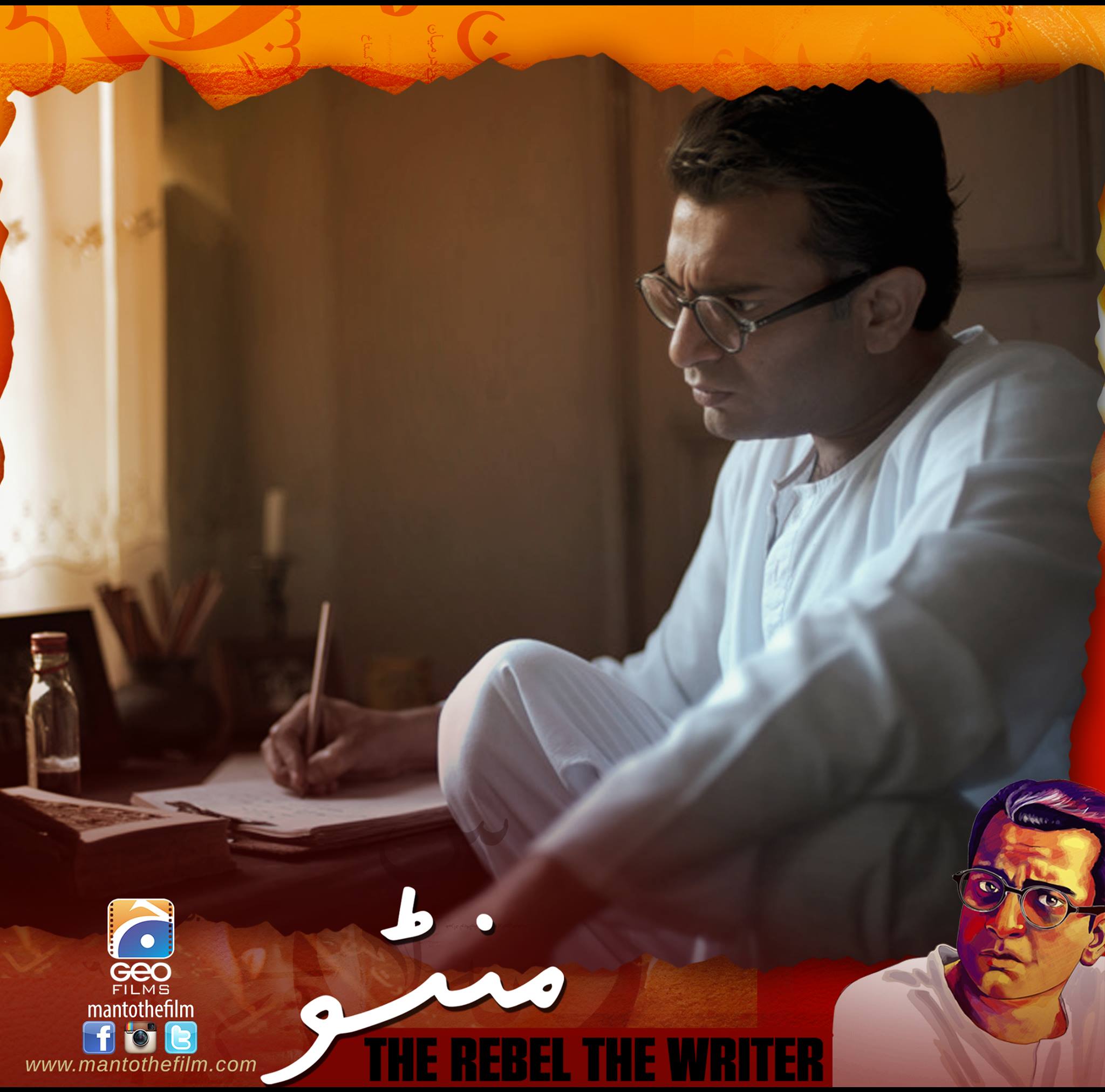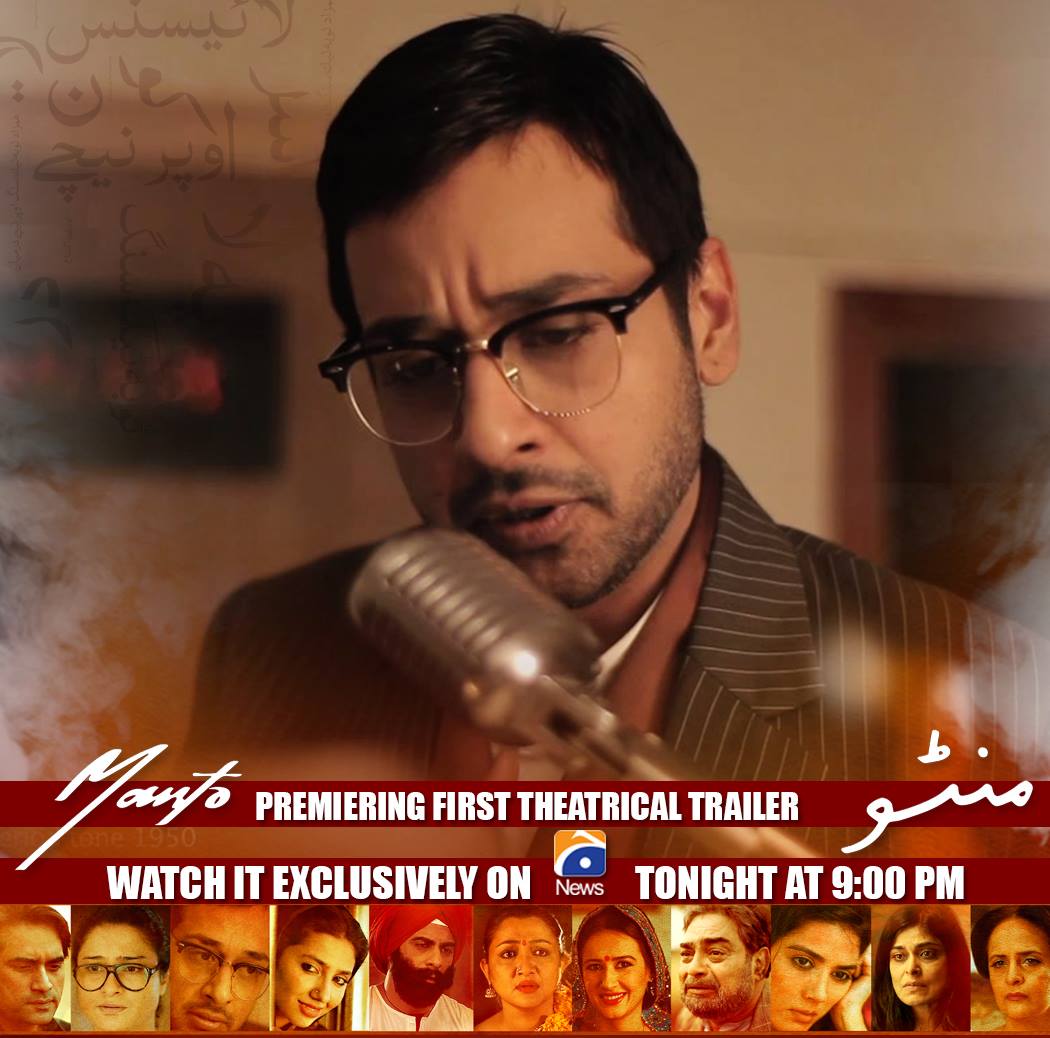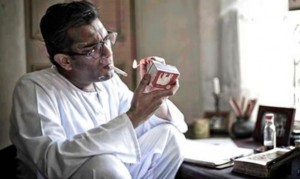Movie Name: Manto
Release Date: 11 September 2015
Director: Sarmad Khoosat
Review by: Aayan Mirza
Aayan Mirza, Editor Galaxy Lollywood (Karachi desk) wasn’t originally supposed to do this review as Manto had its first premiere in Lahore, on 8th September 2015, and the Lahore team, spearheaded by Momin Ali Munshi, Editor Galaxy Lollywood (Lahore desk) was tasked with all the major coverage of the film. The premiere however, was faced with some mismanagement, which even after some remedial measures by the organizers, turned the overall experience of the team sour. Getting the review done at Lahore after the turn of events was felt a little unfair to the readers and the film itself. And since we at Galaxy Lollywood believe that the film should not, in any way, suffer for whosoever’s wrong the bad experience of Lahore was, here is the review of the film done by our Karachi editor, Aayan Mirza. We apologize for the delay.
 Manto is a rare commodity, films like these don’t come very often. A biographical film, a subject like Saadat Hassan Manto, and a project spearhead like Sarmad Khoosat; a definite recipe for a classic. Classic yes, but a word like this is also mostly synonymous to concepts like ‘parallel cinema,’ and ‘art films,’ the slow cinema that is in easy words.
Manto is a rare commodity, films like these don’t come very often. A biographical film, a subject like Saadat Hassan Manto, and a project spearhead like Sarmad Khoosat; a definite recipe for a classic. Classic yes, but a word like this is also mostly synonymous to concepts like ‘parallel cinema,’ and ‘art films,’ the slow cinema that is in easy words.
But Manto, despite being a cut out of that same dramatic genre, managed to create an identity of its own. An identity that would connect with almost everyone sitting in the hall, a story that would make you regret for not being all eyes to it, performance that, scene after scene, would simply leave you at awe.
The film is mainly set in the concluding few years of Saadat Hassan Manto. The story in few words was a juggle at portraying Manto as a legendary writer that he was, a ‘largely loving’ family man and a person who almost always found himself to be at the odds of life.
The screenplay despite being that of a drama film was very live in nature. Combined with the overall ambiance of the film, the story was not only amazingly gripping from the very first scene to the last, but with every scene concluding, it would only go stronger in the next, story wise making the entire film a special stand-out.
Emotionally, the story connects with you at all levels, be it the scenes depicting Manto’s financial struggle, or the ones projecting him sharing a smile with Noor Jehan, the one where he has to battle between yet another financial crisis, a closing in Martial Law, a daughter’s medication and a little self serving or the scene where he desperately tries to make redemption for his wrongs, it’s all absolutely just excellently presented.
Complementing such powerful screenplay were some even more powerful performances. God, what else can you expect with the presence of brilliance like Sarmad Khoosat, Sania Saeed, Irfan Khoosat, Nimra Bucha, Nadia Afghan and so many other amazing actors.
Sarmad Khoosat has done the acting of his life. We had seen him acting in past; Shashlik with Nadia Afghan being the highlight of that era, and we always knew he had the potential, but Manto, despite all that was a big, fat, pleasant surprise. Just as Naseeruddin Shah gave a face to Mirza Ghalib for people today, Sarmad will stay people’s Saadat Hassan Manto. For a long, long time. And this just does not come by making and acting in a biographical film on someone, this comes with doing it with immense conviction and authority, something that Sarmad Khoosat has done without any flaw, without any doubt. No one, no one in the world could have done it and fit at it any better than Sarmad Khoosat.
Sania Saeed as Saadat Hassan Manto’s better half was also spine solid in her role. With grey, black, white and all sorts of different shades to the lead character’s life, Sania gave a sense of calmness in the film, a sort of balance in Saadat Hassan Manto’s personal life scenes. Between the character Safiya Manto and the actor Sania Saeed, the stand-out seemed to be Sania, the actor, but it maybe because her character didn’t really have much to play with. Also great as ever were Irfan Khoosat and Nimra Bucha, the former appearing in the depiction of Manto’s short story ‘Khol Do’, and the latter as Manto’s alter ego. Both were simply brilliant.
 Apart from the film’s regular ensemble cast, the film had numerous cameos as well, including the ones by Mahira Kha, Irfan Khoosat, Shamoon Abbasi, Humayun Saeed, Yasra Rizvi, Mohammed Hanif, Savera Nadeem, Azfar Rehman and many others, but the one that stood out among all was that of Faisal Qureshi. What an impression leaving, light hearted, excellently done part. A part that was again one of the balance creators in what would have otherwise been a very dark film.
Apart from the film’s regular ensemble cast, the film had numerous cameos as well, including the ones by Mahira Kha, Irfan Khoosat, Shamoon Abbasi, Humayun Saeed, Yasra Rizvi, Mohammed Hanif, Savera Nadeem, Azfar Rehman and many others, but the one that stood out among all was that of Faisal Qureshi. What an impression leaving, light hearted, excellently done part. A part that was again one of the balance creators in what would have otherwise been a very dark film.
Saba Qamar as Madam Noor Jehan also seemed to be knowing what she was doing, where her acting identity might have gotten a little tarnished at Hum Sab Umeed Sey Hain (HSUSH), she has also picked a lot at the show. Mimicking Madam’s expressions and typical mannerisms is one example of that. Her performance didn’t have much difference to her role at HSUSH, but it was the easiness with which she did it all. Not bad, not bad at all.

Direction, well, Sarmad Khoosat. Need I say more? As great as ever. Sarmad experimented a lot in the film, there were shades within shades, subtext and a lot of between the line meanings. A treatment that suited very well to a still pretty controversial subject like ‘Manto.’ Be it a scene as little as Manto’s prep for his writing routine; a bottle of whiskey, a cigarette, an ink-full pen, an ink pot, a writing pad and a numeric ‘Bismillah’ atop the page to something as big as the classy slow motion portrayal of ‘Thanda Gosht,’ it was all brilliant. Not to forget the scenes of Nimra Bucha as Saadat Hassan Manto’s alter ego. Just wow.
 One special mention goes for the excellent detailing in the film. Making a period film is a tough job, it demands an insane amount of research and insight into your subject. With Manto, you can see all that insanity done with the film. From the matchbox and cigarette pack to the fashion of that time. All has been taken care of, all has been researched well.
One special mention goes for the excellent detailing in the film. Making a period film is a tough job, it demands an insane amount of research and insight into your subject. With Manto, you can see all that insanity done with the film. From the matchbox and cigarette pack to the fashion of that time. All has been taken care of, all has been researched well.
The film, however, didn’t have a typical grand ‘film-feel’ to it, something that one may miss at times. This absence might have been a concious effort since there is a planned TV serial to sequel the film, or it might have been Sarmad just not entirely withdrawn from his short screen training.
The editing, too, could have been a little more crisp as the second half in terms of the film-run got dragged a bit. So while the story didn’t go a notch down till the end, the editing lost a few breaths in the second half.
The background score was although not one of the highlights of the film, but it wasn’t bad at all at creating a particular rural-urban ambiance of Lahore then. But the songs, man, such great music. The lyrics, the compositions and the vocals, all superbly done jobs. The best part was that it had something for almost everyone. You would take at least one song home with you, mine was Ali Sethi’s ‘Aah Ko Chahiye,’ and it has stayed with me since. Job very well done.
[fbvideo link=”https://www.facebook.com/MantoTheFilm/videos/912201005502992/?permPage=1″ width=”700″ height=”700″ onlyvideo=”1″]






